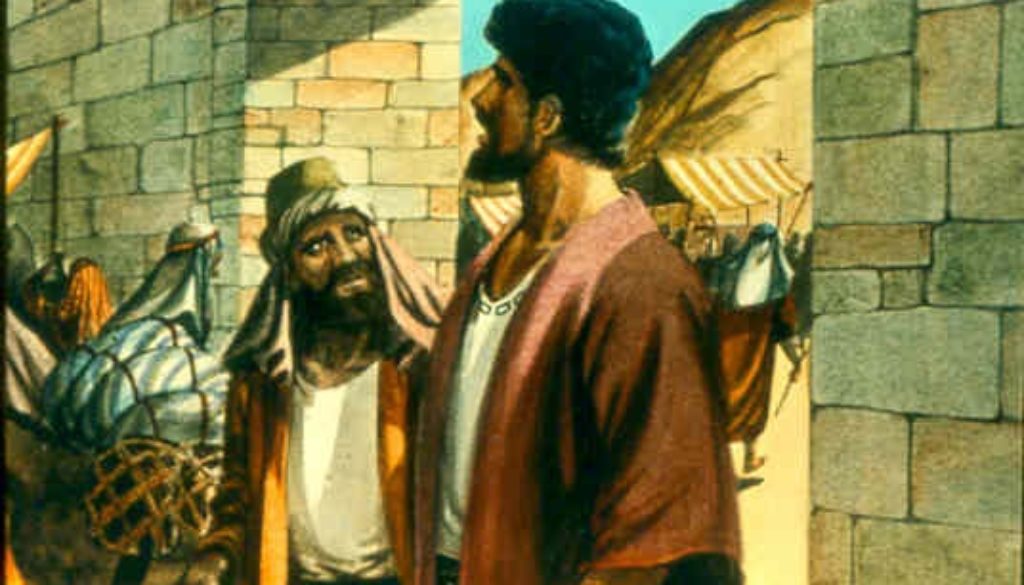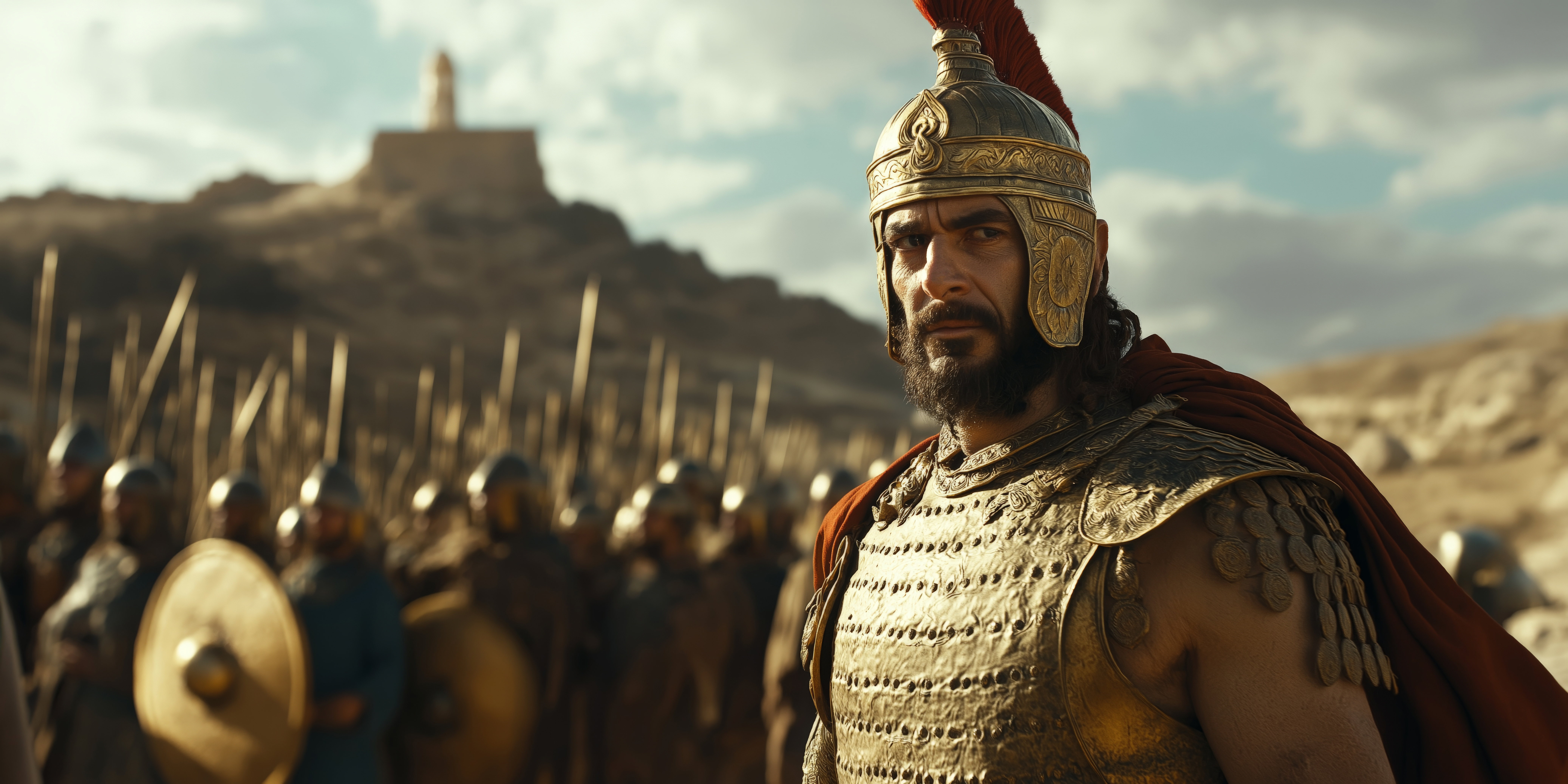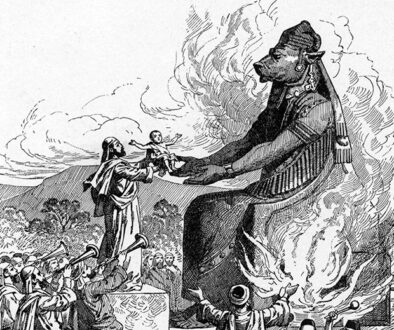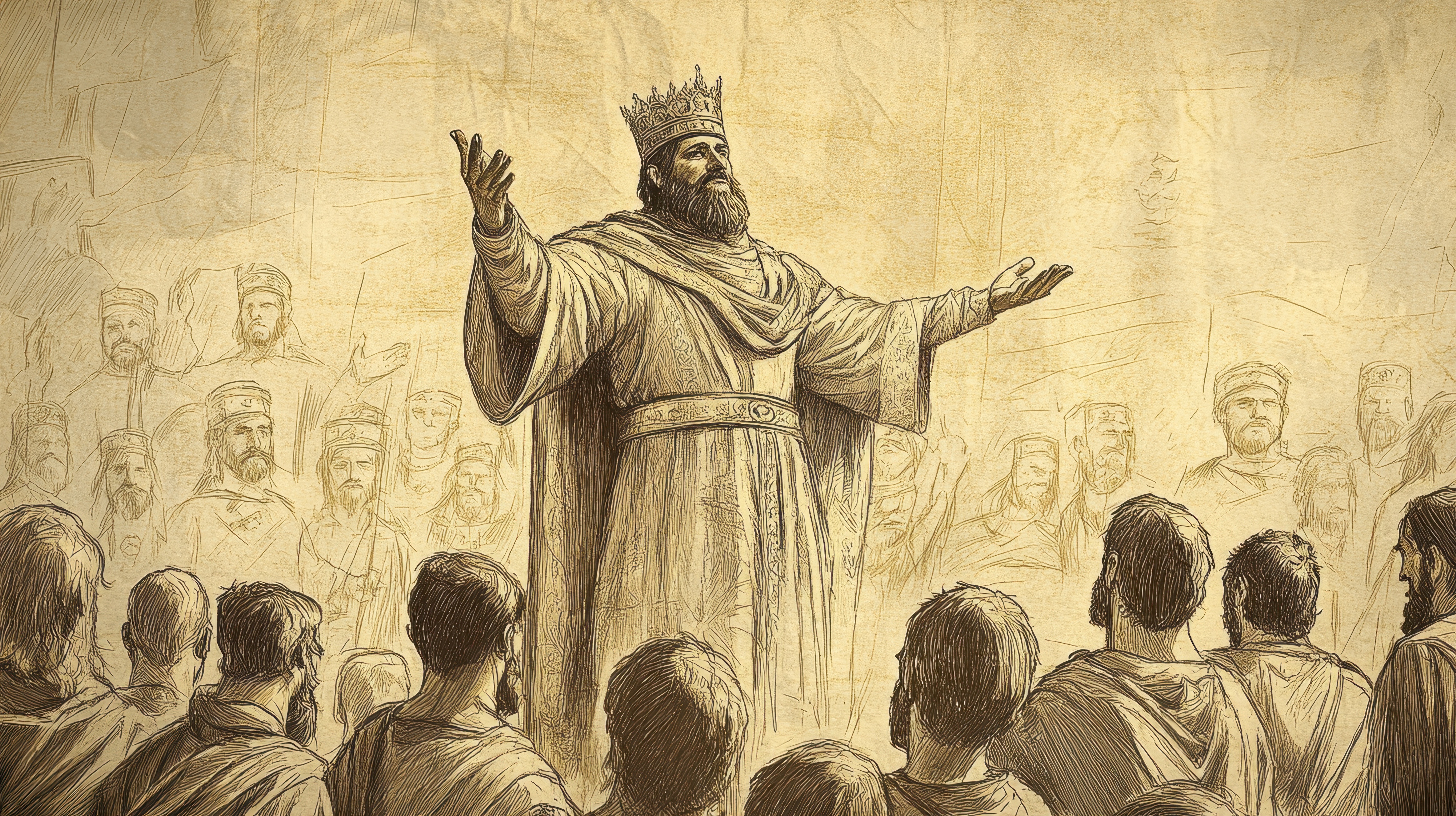1 Samuel 9:1-27 Prince First
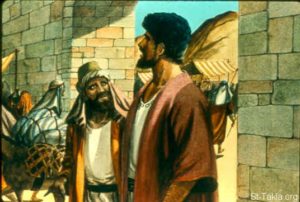
Samuel is going to anoint Israel’s first king but he will be a prince first. He stands head and shoulders above his competition.
The first king that God chooses will be one that pleases the people. He was a natural! He stands out in many ways. He is taller than anyone else. He is handsome; “There was not a man among the people of Israel more handsome than he” (verse 2b). And his father is rich. These are traits man would look for in his king.
But there is more to this young man than just his appearance and pocket book. He is a faithful son, humble, hard-working, obedient and respectful. This young man’s name is Saul. He has an appointment with the Lord that he knows nothing about.
♥ ♦ ♥
In the territory of Benjamin there is a man named Kish. He is a very successful donkey breeder. The donkey is an important animal in Israel as it is sure footed and sturdy. The donkey can carry man or supplies up and down the hills of Israel with ease. A well trained donkey can even find its way home if it gets lost. Kish’s donkeys are some of the best donkeys in the region.
One night a fox snuck into Kish’s field and several of his donkeys fled. These were younger donkeys who wouldn’t know how to find their way home yet. They could at least be expected to stay together. The older donkeys were able to stomp the fox to death before it could do harm to them or the escaping donkeys. Those entrusted with the care of the donkeys came running when they heard the donkeys distressed braying.
Morning came before the effects of the night were fully realized. Seven donkeys had escaped in the night. Kish would have to send men out to search for them and since there was no way to know which direction they fled he would need to send out several teams. Kish calls for his son, Saul to be on one of the search teams. Saul is a very skilled herder as he began learning the trade of his father at a young age.
“Saul, I need you to join the search. Take one of the men with you. You are my best hope for bring those donkeys home safely.”
Saul is pleased with his father’s confidence in him. “I will do all I can to ensure their safety father.” Saul bows his head and goes to where the searchers are assembling. As the master’s son he will have his pick of companions for the search. He quickly selects Zachar, grabs bags of bread and water skins for the two of them and begin their search.
The first place Saul goes is the place where the fence was broken. He expects to find tracks of the escaping donkeys. Because there hasn’t been any rain for a while it may be more difficult to discern the tracks but the number of escapees should increase their signs of egress significantly.
Saul easily spots hoof prints which he and Zachar follow. The other teams fan out to cover other directions that the donkeys may have doubled back on during their fright. Saul and Zachar are able to follow the tracks for a short distance only before they lose the trail. The ground has become hard and won’t hold a print. There is also so little vegetation that the donkeys could easily pass through without disturbing it.
“This is going to take a little longer than I thought” says Saul.
“We were doing so well in the beginning. What are we to do now?”
“We will continue on our same direction but we must now move back and forth along our route to ensure they haven’t gone into a little valley or another field. We will keep our eyes open for any tracks and trace them down to their source too.”
The two men search all day without even stopping for meals as they can dip into their bread sacks while still on the move. They need to find the donkeys soon before they come into more danger or get claimed by bandits. That night they make camp by the roadside leading into Shalishah. They were on the move again as soon as morning broke, working their way carefully through the region of Shalishah and Shaalim.
While Saul and his companion are faithfully going about their duties the Lord is calling Samuel to a new duty. A short time ago the people of Israel had demanded that they have a king. Try as he might, Samuel could not persuade them not to do this. Their hearts were set on having one appointed man to rule over them instead of continuing with the many judges God had set in place. Those judges did NOT all follow the Lord and they wanted something more permanent.
“Samuel.”
“Speak Lord. Your servant is listening.”
“Tomorrow about this time If will send to you a man from the land of Benjamin, and you shall anoint him to be prince over my people Israel. He shall save my people from the hand pf the Philistines. For I have seen my people, because their cry has come to me” (verse 16).
Samuel knew God would be choosing a man soon as He had agreed to the people’s demands but their rejection of Him still hurt. He would follow the Lord’s command though and prepare for this momentous occasion.
Samuel sent word to the city officials that there would be a sacrifice and a feast on the morrow. The sacrifice would take place in the early morning and the feast would be set to happen early in the evening. He doesn’t tell the people the purpose of the sacrifice and feast. They are used to this though because Samuel often calls for such events when the Lord so moves him. They have learned to be patient. He will reveal the meaning and the Lord’s words in His time.
Preparations for the feast and the search for the donkeys continue for the respective parties for the rest of the day. As all retreat into sleep that night they unknowingly march closer to their appointment with the Lord’s will.
Morning breaks. Saul and Zachar rise to continue their search. This is the beginning of their third day of searching. Their bread bags contain only crumbs. Their water skins have been refilled multiple times at the streams they have encountered during their quest. They are sole weary but faithful in their pursuit. As long as there is a chance of finding the donkeys these two men will hold fast to it.
Morning breaks also in the town of Ramah. The elders gather at the home of Samuel. They are ready to assist him in his sacrifice to the Lord. Samuel leads the way to the place he has set aside some time ago for a place to make his offerings to the Lord. It is not the Tabernacle at Shiloh nor the home where the Ark of the Lord currently resides but it is a place where he has met the Lord often. It is their special place.
Wood is gathered and laid on the altar. The ram is brought forward and Samuel quickly slices its throat. The blood is collected to be sprinkled on the altar once the offering once the Lord’s portion has been burned. The rest will be taken to the high place to be prepared for a meal for all those who were invited. Samuel accompanies the meat to its preparation location. He has a special request to make of the one in charge of the preparations.
“When you have thoroughly cooked the meat you must set aside the right front leg. This will be a special portion. On that portion make sure it is well seasoned and accompanied by the best of the vegetables and bread. Hold this portion until I call for it.”
The head server nods in understanding. She will see to this task herself. Samuel leaves her to her work and knows there will be nothing left undone by this skilled woman.
On the hunt for the donkeys, Saul is getting discouraged. Over the past three days they have chased down MANY false trails. He is tired and hungry and they are days from home. Saul’s thoughts turn to his father. He knows the donkeys are important to him but he also knows that his father cares for him even more.
“This is ridiculous! We have been searching for DAYS. I do not believe we are going to find them this far from home. We need to return before my father stops worrying about the donkeys and starts worrying about me!”
“I hear you. But let’s try one more thing.”
“And what would that be?” asks Saul.
“There is a man of God in this city, and he is a man who is held in honor; all that he says comes true. So now let us go there. Perhaps he can tell us the way we should go” (verse 6).
“But if we go, what can go bring the man? For the bread in our sacks is gone, and there is no present to bring the man of God. What do we have?” (verse 7).
“Here, I have with me a quarter of a shekel of silver, and I will give it to the man of God to tell us our way” (verse 8).
“’Well said; come, let’s go’ (verse 10a). Perhaps he can restore success to our journey.”
As Saul and Zachar are going up the hill towards the city they come across a group of women on their way to the watering hole. Each is carrying her jar and talking animatedly amongst themselves. As they approach quiet descends upon the group. All eyes, even those that appear to be diverted downward out of propriety, are fixed on this handsome young man and his companion.
Zachar speaks to the group. “Is the seer here?”
The eldest of the group speaks for them. “He is; behold, he is just ahead of you. Hurry. He has come just now to the city, because the people have a sacrifice today on the high place. As soon as you enter the city you will find him, before he goes up to the high place to eat. For the people will not eat till he comes, since he must bless the sacrifice, afterwards those who are invited will eat. Now go up, for you will meet him immediately” (verses 12-13).
Saul was amazed at the amount of information she provided to such a simple question. He wondered if she would ever stop. He couldn’t help being fidgety when she pointed out the seer but he held his place until she had finished all she had to say. Both men gave a slight head bow and continued quickly on their way.
Saul and Zachar met up with Samuel as he was coming out of the city towards them. Saul thought it a bit strange that he was coming out of the city when he was told that he had just arrived. Maybe he was on his way to the high place now to eat. He hoped he would take the time to meet with them.
Samuel has been keeping an eye on the time as it passed. He knew it was very near the time the Lord told him that he would be meeting the man he was to anoint over Israel. As his eyes travel the road in front of him he sees two young men approaching him. One is VERY tall and handsome in a rugged sort of way.
“Here is the man of whom I spoke to you! He it is who shall restrain my people” (verse 17b) said the Lord to Samuel.
“Here we go then” thinks Samuel as he doesn’t even break stride as he continues on his way out of the city. He doesn’t make it beyond the shadows of the gates when the young men approach him.
Saul politely enquired of the man before him; “Tell me where is the house of the seer?” (verse 18b).
“I am the seer. Go up before me to the high place, for today you shall eat with me, and in the morning I will let you go and will tell you all that is on your mind.”
Saul is confused by Samuel’s familiarity with them. He hasn’t asked their names. They haven’t asked him any questions. They haven’t even given them their gift. Yet here he is inviting them to eat the sacrifice of this city with him and telling them to stay the night.
“…As for your donkeys that were lost three days ago, do not set your mind on them, for they have been found…”
“How did he know that we were searching for my father’s donkeys? And that they were already found?” wonders Saul
“…And for whom is all that is desirable in Israel? Is it not for you and for all your father’s house?” (verses 19-20).
Now Saul is really taken aback. With confusion on his face and a hand to his breast he tells Samuel of his lowly status. “Am I not a Benjaminite, from the least of the tribes of Israel? And is not my clan the humblest of all the clans of the tribe of Benjamin? Why then have you spoken to me in this way?” (verse 21).
Samuel waves away Saul’s protest as if shooing a fly away from him. He then takes both men and turns them in the direction he is going. “Come” he says. He doesn’t even look back to see if they are following him as he strikes out on his journey.
Saul and Zachar look at one another, shrug their shoulders and then follow the man of God. No more is said by the seer until they reach the high place and the hall where the feast has been prepared.
Saul and Zachar have agreed amongst themselves to slip into the background of the room. They feel like interlopers. This isn’t their town nor their feast. They don’t know what to make of the ‘invitation’ they were extended. As they near the door the Samuel turns to Saul, takes hold of his shoulders, and propels him to the head of the table. To Zachar, he calls him to come.
All eyes are on Samuel as he seats Saul and Zachar. Saul is uncomfortable here. He has never sat in the seat of honor. This is a place his father has occupied on many occasions but not himself. He hasn’t even had an opportunity to wash and change from his long journey. But there is no getting out of this without disgracing the seer or himself so he holds himself still. There is no hiding either among the guests as, even seated, his head reaches the highest in the room.
Samuel steps away from his honored guests and speaks to the head cook. “Bring the portion I gave you, of which I said to you, ‘Put it aside’” (verse 23).
The cook immediate leaves the room and returns moments later carrying a platter loaded with the finest of the feast. She follows Samuel’s direction and places the platter in front of Saul, in the seat of honor.
Mouths have been restrained during this process but not minds. “Who are these men?” and “Why is Samuel honoring them?” are the two prominent questions circling in the minds of those looking on.
After the platter is set before Saul Samuel addresses him again. “See, what was kept is set before you. Eat, because it was kept for you until the hour appointed, that you might eat with the guests” (verse 24b).
The people of Ramah have seen unusual things from Samuel over the years so they assume it is something the Lord has called him to do. They will not fight it or make a fuss about it. They will simply accept the fact that these men are honored guests of Samuel’s and treat them accordingly.
Saul and Zachar are grateful for the meal as their bread was already gone but they can’t help but be a little confused by all that has happened. If it weren’t for the words of the seer that were SO specific to their circumstances Saul might have thought they were being confused with another.
Well into their meal Samuel, Saul and Zachar learn each other’s names. Samuel hadn’t asked their names in all the times he had spoken to them. Saul and Zachar were content to go on referring to Samuel as ‘the seer’ but they heard his name from the lips of those around them. Saul and Zachar provided their names to their table mates when asked. Samuel never did request their names. He seemed to already know.
After the meal is over Samuel once again calls for Saul and Zachar to follow him. They come to a house where Samuel feels right at home. It doesn’t appear to be Samuel’s actual home but one where he is given deferential treatment at all times. Samuel asks for beds to be made for his two guests and mats are immediately laid on the roof for the two men.
Sleep settles quickly on the house. There seems to be a peace here that puts even the most stubborn fears to rest. Saul has not had such a peaceful sleep in all his days and neither has Zachar. There is no concern for the donkeys, the travel that lies ahead of them, nor the concern Kish might be feeling.
Saul and Zachar slept so soundly that when morning came Samuel had to rouse them. “Up, that I may send you on your way” (verse 26b) calls Samuel from the top of the ladder. Saul and Zachar instantly wake and begin tiding up the mats they slept upon. Samuel waits at the top of the ladder until all three are ready to descend into the house.
Samuel hands each man a bag with bread and a freshly filled water skin. Together they leave the house and turn towards the gates of the city. As they begin walking Samuel tells Saul to send his servant on ahead. “Tell the servant to pass on before us, and when he has passed on, stop here yourself for a while that I may make known to you the word of God” (verse 27b).
“Finally!” thinks Saul, “I’m going to get some answers.” Saul turns to Zachar and tells him that he will meet him at the well beyond the city gates. Zachar had heard Samuel’s words even though they were spoken softly to Saul. Zachar nods and walks briskly on ahead.
(to be continued)
♥ ♦ ♥
When I introduced Saul in the beginning of our time together I stated he had some qualities beyond his physical appearance that would benefit him as a king. I stated that: “He is a faithful son, humble, hard-working, obedient and respectful.” We see these things weaved throughout our story.
Saul did not resist his father’s command when told to go look for the donkeys. He looked long and hard for them. He didn’t put the task off onto his servant, he worked side by side with the man. Saul did not give up easily on the task he was assigned. He worked at until he reached the point where he was concerned for his father’s well-being. When Samuel praised him, Saul did NOT take this praise on as deserved in any way. He deflected it with the truth as he saw it. He did not feel worthy of Samuel’s words. Saul also did not make a scene by refusing Samuel’s direction and honor in front of the guest at the feast. Even if he didn’t feel he deserved the honor, he honored and respected Samuel but conducting himself appropriately. And as Saul and his companion were leaving the city with Samuel, Saul was obedient again to Samuel. He had not insisted on answers the night before. He patiently waited until Samuel was ready to share his heart with him.
God chose Saul more for his outward appearance than his heart but He got a good deal with both. Saul would be the king the people would have chosen because of his looks. But, for a time at least, his beauty was more than skin deep.
Father God, thank You for taking me inside the story again today. It wasn’t nearly as deep as some of them You let me walk through but it was still fun. I wonder how Saul really felt when Samuel first started talking to him. Was he confused? Was he excited? Did he wonder how this man knew him? Talk about a mind blowing moment!
I’m also curious why the servant had money and Saul didn’t. I know, it’s a strange thing to focus on but it is something I can’t quite shake off. Did the money come from Kish to be used to hire help if needed? If so, why wasn’t it given to Saul? Was it the servant’s personal money that he just happened to bring with him on this trip? He was quick to offer it up, whatever its source, to help aid them in their search. Was his quarter shekel the same as the widow’s mite, when it came to surrendering it to the Lord? I guess this is another topic for the bench. I wonder if I will even remember any of them when I finally do see You face to face. Maybe by then they will hold little importance or interest for me.

